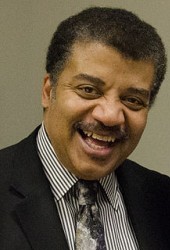The problem, often not discovered until late in life, is that when you look for things like love, meaning, motivation, it implies they are sitting behind a tree or under a rock. The most successful people recognize, that in life they create their own love, they manufacture their own meaning, they generate their own motivation. For me, I am driven by two main philosophies, know more today about the world than I knew yesterday. And along the way, lessen the suffering of others. You'd be surprised how far that gets you.
The best educators are the ones that inspire their students. That inspiration comes from a passion that teachers have for the subject they're teaching. Most commonly, that person spent their lives studying that subject, and they bring an infectious enthusiasm to the audience. I think many people have that enthusiasm, but they are prevented from being teachers because they didn't go through the teacher mill. Now you have teachers who have been through the teacher mill, yet they have no capacity to inspire anyone at all. It's the inspired student that continues to learn on their own. That's what separates the real achievers in the world from those who pedal along, finishing assignments.
No matter who you are, engaging in the quest to discover where and how things began tends to induce emotional fervor—as if knowing the beginning bestows upon you some form of fellowship with, or perhaps governance over, all that comes later. So what is true for life itself is no less true for the universe: knowing where you came from is no less important than knowing where you are going.
Life is too short for me to worry about something I have no control over that I don’t even know will happen. People ask ‘if Earth is going to be swallowed by a black hole or if there is some disturbance in the spacetime continuum should we worry about it?’. My answer is ‘no’ because you won’t know about it until it crosses your... your place in space-time. Your beats come to you when nature decides it’s the right time... be it the speed of sound, the speed of light, the speed of electrical impulses we will forever be victims of the time delay between information around us and our capacity to receive it.
Kids are never the problem. They are born scientists. The problem is always the adults. They beat the curiosity out of the kids. They out-number kids. They vote. They wield resources. That's why my public focus is primarily adults.
Science is a cooperative enterprise, spanning the generations. It's the passing of a torch from teacher, to student, to teacher. A community of minds reaching back to antiquity and forward to the stars.
Yes, the universe had a beginning. Yes, the universe continues to evolve. And yes, every one of our body's atoms is traceable to the big bang and to the thermonuclear furnace within high-mass stars. We are not simply in the universe, we are part of it. We are born from it. One might even say we have been empowered by the universe to figure itself out — and we have only just begun.
If you start wielding a hammer, then all your problems look like nails. And maybe they’re not. Maybe it's more subtle than that. And so your toolkit has to be able to morph into what is necessary for what it is that you confront at that moment.
